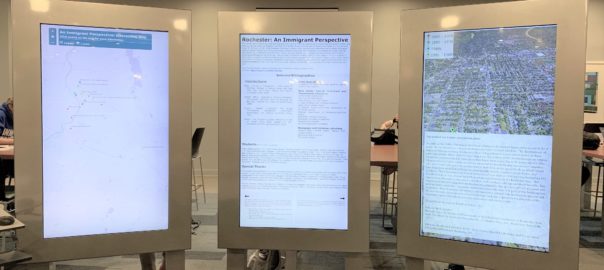Thoughtful Pedagogy, Innovative Projects
The digital pedagogy workshop series began in August 2018 as a means to cultivate a learning community around digital pedagogy among the University of Rochester faculty and staff in an environment where faculty, librarians, and Digital Scholarship Lab specialists could work together to inspire new collaborations. Over the course of two days, faculty members paired up with librarians to brainstorm and design class assignments in which a digital tool plays an essential role.
We began by exploring some great examples of digital assignments, and the role they can play in students’ education for the world ahead. There is an occasional tendency in teaching with digital tools for the tool to become the focus of the learning, rather than the course content. To help prevent this, the workshop participants first established learning objectives for the assignment, preparing a draft without any discussion of a specific tool. Specialists from the Digital Scholarship Lab then worked with the faculty and librarians to brainstorm potential digital tools to meet course objectives. The assignments were then re-written, incorporating digital elements. The next day was focused on testing these new assignments or projects, seeing what worked, what didn’t, and then sharing lessons learned with the other participants.
Learning from Past Experiences
This year, we adapted the same model with one notable adjustment: In the opening session, we invited a professor who attended the previous year back to share her experiences implementing the assignment she created. We also asked a student to join and provide their perspective on using digital tools in the classroom. This vibrant conversation ran over by almost an hour, and really highlighted the role students can play in assignment design.
Building a Community Across Disciplines
We’ve had faculty from a variety of disciplines across the university attend these two workshops. The 2018 cohort included two faculty members from the Writing Speaking and Argument Program, two faculty from Modern Languages and Cultures, one from Earth and Environmental Sciences, one from Linguistics, one from Biomedical Engineering, and one from Philosophy. This year, we had one Education faculty member, three from Modern Languages and Cultures, one from Public Health, one from Digital Media Studies, and one from Mechanical Engineering. About a dozen projects, course assignments or collaborations have germinated from the workshops.
Digital literacy is at its best when intertwined with academic knowledge. Bringing them together makes it possible to spot otherwise unseen opportunities for our faculty and students, further enriching teaching, learning and research at the University of Rochester, and in turn preparing our community for jobs that might not yet exist, inspiring technologies that have yet to be invented, and to solve problems that we don’t know are problems yet.
As they are not discipline-specific, using digital tools frequently promotes new collaborations across multiple academic departments, the libraries, and IT. A number of these were borne out of this workshop, and a learning community around digital pedagogy has formed as more faculty look for meaningful ways to develop skills and competencies necessary for the 21st century learner.
